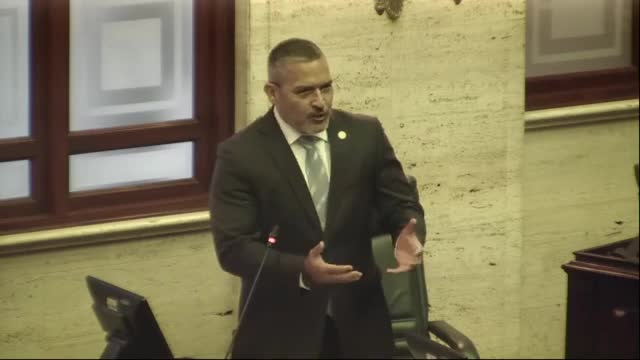Puerto Rico's Legislative Struggle Against Fiscal Control Board Highlights Colonial Status Debate
June 29, 2024 | House of Representatives, House, Committees, Legislative, Puerto Rico

This article was created by AI summarizing key points discussed. AI makes mistakes, so for full details and context, please refer to the video of the full meeting. Please report any errors so we can fix them. Report an error »

In a passionate address during the Cámara de Representantes meeting on June 29, 2024, a representative raised critical questions about Puerto Rico's governance and its colonial status under U.S. oversight. The speaker emphasized the pressing need for clarity on who holds the power to allocate resources, set public employee salaries, and address pension claims for retirees.
Highlighting the role of the Fiscal Control Board, appointed by the U.S. President, the representative criticized its influence over Puerto Rico's budgetary decisions, stating, "We are here today approving the budget not because of the Senate or the House, but because the Board decided what language was acceptable." This assertion underscores the ongoing struggle for self-determination and the limitations imposed by external control.
The representative argued that the current colonial status hinders Puerto Rico's ability to make autonomous decisions, stating, "Until we address the status issue, these problems will continue." The call for a resolution to Puerto Rico's political status—whether through statehood, independence, or free association—was framed as essential for the island's future.
In closing, the representative expressed hope for a future where Puerto Ricans can decide their destiny without external interference, urging unity among legislators to work towards this goal. The meeting highlighted the urgent need for dialogue on Puerto Rico's political future, reflecting a broader sentiment among many Puerto Ricans seeking equality and self-governance.
Highlighting the role of the Fiscal Control Board, appointed by the U.S. President, the representative criticized its influence over Puerto Rico's budgetary decisions, stating, "We are here today approving the budget not because of the Senate or the House, but because the Board decided what language was acceptable." This assertion underscores the ongoing struggle for self-determination and the limitations imposed by external control.
The representative argued that the current colonial status hinders Puerto Rico's ability to make autonomous decisions, stating, "Until we address the status issue, these problems will continue." The call for a resolution to Puerto Rico's political status—whether through statehood, independence, or free association—was framed as essential for the island's future.
In closing, the representative expressed hope for a future where Puerto Ricans can decide their destiny without external interference, urging unity among legislators to work towards this goal. The meeting highlighted the urgent need for dialogue on Puerto Rico's political future, reflecting a broader sentiment among many Puerto Ricans seeking equality and self-governance.
View full meeting
This article is based on a recent meeting—watch the full video and explore the complete transcript for deeper insights into the discussion.
View full meeting